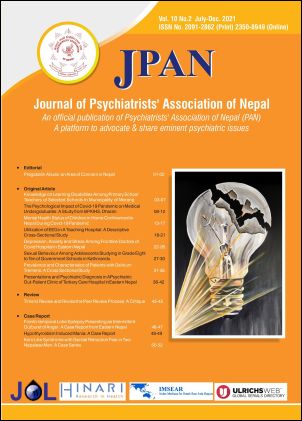Mental Health Status of Children in Home Confinement in Nepal During Covid-19 Pandemic
DOI:
https://doi.org/10.3126/jpan.v10i2.48999Keywords:
Lockdown Nepal, Child Adolescent Depression Anxiety, COVID-19, Mental healthAbstract
INTRODUCTION Since the declaration of COVID-19 as a pandemic there has been many public health strategies implemented to decrease it's extraordinarily adverse consequences. On March 18 2020, an estimated 107 countries around the world implemented national school closures and the Government of Nepal followed sooth on March 19. Children across European countries felt isolated due to the lockdown according to Save the Children, with increasing levels of feeling psychological distress. The effects of COVID-19 may be assumed to exert more negative life outcomes (depression, anxiety, domestic violence and loneliness) for children as it was more severe, unknown and fatal. This study is designed with a to assess the perspective of the child's mental health condition.
METHODOLOGY A descriptive cross-sectional online survey was done among children from two selected schools of Kathmandu, Nepal. Emails were sent to the children via the parents, following permission taken from schools, which contained a semi-structured pro-forma and Revised Child Anxiety and Depression Scale 25, along with and informed assent form.
RESULT In the study 29.3% of the respondents were of age 14 years, maximum age of 18 (1.1%) and minimum age 12 (8.7%) with mean age of 14.4 and sd ±1.41. More than half 58.7% of respondents were girls. Similarly, most of the respondents (35.3%) were studying in grade 10. Likewise,73.4% of respondents were living in nuclear family. Moreover, less than half 48.9 of the respondents belong to the Lower Middle Class and only 1.1% belong to the upper class of socio-economic status. The maximum number of respondents have scored between 0-64 which means that majority of the respondents were in low severity in respect to depression and anxiety.
CONCLUSIONS We found an increase in the levels of anxiety and depression in Nepali children and adolescent compared to pre-pandemic study. Policy makers should be alerted to this fact and judicious use of technology and strength of existing communities should be used to mitigate this in the future.
Downloads
Downloads
Published
How to Cite
Issue
Section
License
Copyright (c) 2021 Journal of Psychiatrists' Association of Nepal

This work is licensed under a Creative Commons Attribution 4.0 International License.
This license enables reusers to distribute, remix, adapt, and build upon the material in any medium or format, so long as attribution is given to the creator. The license allows for commercial use.




